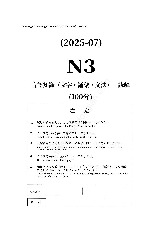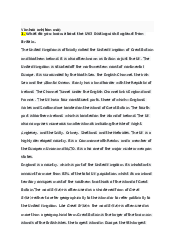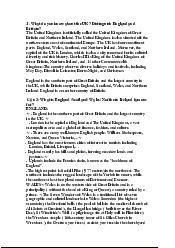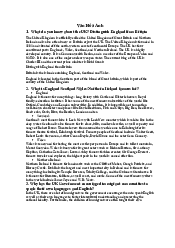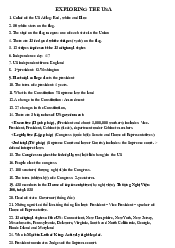






Preview text:
Câu 1: What do you know about the UK? Distinguish England and Britain
Full name of the UK is The United Kingdom of Great Britain and Northern Ireland
The UK is situated off the north-western coast of continental Europe. It comprises
England, Scotland, Wales and Northern Ireland.
The UK has four constituent parts : England, Wales, Scotland and Northern Ireland The capital is London.
Charles III is King of the United Kingdom of Great Britain and Northern Ireland and 14 other Commonwealth kingdoms.
Some of the most outstanding and famous destinations are Buckingham Palace, Big
Bend Clock Tower and Stonehenge, Cambridge, oxford and so on.
The UK has famous holidays and festivals such as May Day, Diwali In Leicester, Burns Night, Christmas and so on.
England is the southern part of Great Britain and the largest country in the UK while Britain
comprises England, Scotland, Wales and Northern Ireland. England is a member country of Britain.
Câu 2: What is England /Scotland/ Wales/ Northern Ireland famous for? ENGLAND:
England is the southern part of Great Britain and the largest country in the UK.
London is the capital of England and The United Kingdom, a vast metropolitan area and a
global of finance, fashion, and culture.
There are many well-known English people: William Shakespeare, Newton, and Queen Victoria,...
England has the most famous cities of interest to tourists including London, Bristol, Liverpool,…
England mostly has hills and plains, forming meadowlands and pastures.
Uplands include the Pennie chain, known as the “backbone of England”.
The highest point is Scafell Pike ( 977 meters) in the northwest. The northeast includes the
rugged landscape of the Yorkshire moors, while the southwest has the upland moors of Dartmoor and Exmoor. WALES
Wales is on the western side of Great Britain and is a principality ( without the head of a
King or Queen), a country ruled by a prince.
The Seven Wonders of Wales is a traditional list of seven geographic and cultural landmarks
in Wales: Snowdon (the highest mountain), the Gresford bells ( the peal of bells in the
medieval church of Ali Saints at Gresford ), the Llangollen bridge ( built it over the River
Dee), St Winefride’s Well ( a pilgrimage site at Holywell in Flintshire) the Wrexham steeple
(16th-century tower of St. Giles Church in Wrexham ), the Overton yew trees ( ancient yew
trees in the churchyard of St Mary’s at Overton-on-Dee) and Pistyll Rhaeadr ( Wales’s tallest waterfall, at 240 ft of 75m). SCOTLAND
Scotland is in the north of Great Britain.
The highest mountain in the British Isles is found here, including Ben Nevis, the highest
peak at 1,344 meters ( 4,409ft).
Scotland’s most famous lake is Lock Ness with the Nessie monster.
Scotland is also famous for its clans, kilts, medieval castles, as well as poetry and songs of Robert Bums.
Theatre lovers from around the world come to Edinburgh for its famous theatre festival, the
Edinburgh festival. Famous people of Scotland include Waiter Scott, Rober Louis
Stevenson, and the actor Sean Connery. NORTHERN IRELAND
Northern Ireland consists of six northeastern countries of the island of Ireland and is a part of the UK.
The landscape is mainly How hill country.
The highest point found here is Slieve Donard ( 852 meters).
Lough Neagh in Northern Island is the largest lake in the UK and one of the largest in Europe.
Northern Island is famous for many places of interest such as Belfast City, The
Mountain of Mourne, Lough Neagh, Lough Erne, Strangford Lough, Carling Lough, The
Giant’s Causeway, The Glens of Antrim, Fermanagh Lakeland, The Sprerrin Mountains,
National parks, National Trust Properties, Dromore, County Down.
Câu 3: Why has the UK Government encouraged immigrant communities to speak their own languages and English?
The government encouraged people to continue developing their own culture not only in
English but also in their mother tongue. Besides, they also encourage some magazines or articles
to release bilingual information including English and their mother tongue so that immigrants
will not find it difficult to understand. Additionally, many schools include some subjects which
use two languages to transmit to students or encourage students to communicate in their mother
tongue. This can make sure that equality in the community will be maintained and that there is
no racism between immigrants and local people at all.
Câu 4: Why is standard English with an RP accent the usual model for people learning
British English as a foreign language? What justification can you find for this practice?
The people from Bristol to the East-end of England have RP accents and speak standard English
which is called Southern English accents. RP is a kind of standard form of English that is more
likely to be understood by more English speakers (and those learning English) than any other
English language dialect.RP Speakers speak English very clearly and avoid non-standard
grammatical constructions and localized vocabulary characteristic of regional dialects The
justification we can find for practice is that we can practice by listening to standard English from
a cassette from Bristol to the East-end of London. Besides we can learn from youtube or other
social media platforms like BBC.
Câu 5: Give your comment on the British Parliament British Parliament
The UK Parliament is one of the oldest representative assemblies in the world, with its origins in
the 13th century. The British Parliament consists of 3 parts: the elected House of Commons, the
appointed House of Lords and the Sovereign…The most important part is the House of
Commons. The main functions of Parliament are to pass laws, provide (by voting for taxation)
the means of carrying on the work of government, scrutinize government policy and
administration, including proposals for expenditure and debate the major issues of the day.
Câu 6: Why does the British Prime Minister continue to ‘advise’ and ‘request’ the King,
Queen, when everybody knows that he/she is really telling to monarch what to do?
Theoretically, monarchs have the power to summon, and dissolve Parliament, and give Royal
Assent to legislation passed by the UK. Besides he/she can appoint important office holders
including the Prime Minster and another government minister. He/she also confers peerages,
knighthoods, and other honors. She/He has the power to declare and make peace, recognize
foreign states and conclude treaties. But in reality, Prime Minister is the head of government,
every decision must be suggested and decided by him. He is ultimately responsible for the policy
and decisions of the government. The Prime Minister presides over the meetings with the
monarch to inform her/him of the general business of the Government and recommend a number
of appointments to The Monarch. He also represents the UK at major international events.
Therefore, King/Queen has to ask Prime Minister for advice or requests.
Câu 7: What are the outstanding features of the English education system?
The English school education system is managed through LEAs which are called Local
Education Authorities. Every school has its own curriculums and textbooks.
Two levels of schools including state schools and independent schools are managed closely.
- State school is a school that offers free education and receives money from a Local Education
Authority or directly from the government.
- Independent school is run by a religious group or other independent organization in order to
educate wealthy ladies and gentlemen.
Children follow the National Curriculum in England and the curriculum contain programs of
study for age group split into Key Stages. Four Key Stages :
- Stages 1 and 2 are studied in primary schools
-Stages 3 and 4 in secondary school.
For 16 years-old students, they have to pass the examination to get a GCSE certificate which is
called the General Certificate of Secondary Education. And from 17 to 18 years old, students
who want to continue studying in universities have to take the examination to get AS and A-level certificates.
Câu 8. Give your comment on the British education system(kinds of school, school levels,
curriculum, qualification, management, etc)
There are two types of schools: public schools and private schools
The school level is elementary and middle school. In the program, each school will have its own
textbooks and the degrees are the same as in question 7
The management depends on the public or private school
For 16 years-old students, they have to pass the examination to get a GCSE certificate which is
called the General Certificate of Secondary Education. And from 17 to 18 years old, students
who want to continue studying in universities have to take the examination to get AS and A-level certificates.
Public schools are managed by the state through the LBA, while private schools have a family
management system between the school and the parents.
In my opinion, having two types of schools is very suitable for people in the UK, they will feel
the cost is reasonable and have a choice between public and private schools for their children.
Câu 9: What do the three branches of the UK government do?
There are 3 government departments:
- the legal branch and parliament belong to the legal branch. And make laws
- the executive branch decides how laws are enforced and the prime minister is the head of the executive branch
* Judicial branch is the analysis of laws to protect the rights of working people
Kings and queens belong to the division: The Queen is the head of the executive and plays an
integral part in the legislature.
There are three branches of the UK government: the legislature, the executive, and the judiciary.
To ensure the government is effective and citizens' rights are protected, each branch has its own
powers and responsibilities, including working with the other branches.
-Congress belongs to the legislature and its function is to make laws.
-Prime Minister heads the Executive and they put those laws into effect and plan policy.
-The Judiciary is the analysis of laws to protect the labor’s right and administers justice by
interpreting the law when its meaning is in dispute, ensuring the law is upheld. As Monarch, the
King is head of the executive and plays an integral part in the legislature. In practice, the
Monarch acts on the advice of her ministers.
Câu 10: How many types of family patterns are there in the UK? Which is your favourite? Why? There are 7 types of families:
Nuclear family, extended family, single-parent family, childless family, grandparent family,
step family-blended family or reconstituted family, homosexual or the same sex family.
A nuclear family consists of parents and 1 to 2 children.
- Good points: this family has no financial trouble, the parents take good care of their
children, and their children have good learning conditions. This is a model family that is
popular not only in the US and around the world. This is a new type of family.
- Bad points: Because this family only has 1-2 children, there are times when the
parents are away or have problems, and there is often no one to look after the children,
causing the youngsters to be upset.
The extended family consists of parents and 3 or more children or parents and children and relatives.
Single-parent family: a family consisting of a mother or father and one or more of their children
Childless family: that couple has a lot of freedom, they can pursue their desires
satisfactorily. However, the family has problems, feels sad, and sometimes cannot find a
common purpose in the future because they have no children.
Grand parents-grand child family: family with only grandparents and grandchildren (parents
go to work far away, parents died, or parents divorced, remarried, and couldn't raise their
children, so the grandchild stayed with grandpa. grandma
Blended family: The mother, the father, children of their previous marriages, and children of their current marriage.
Homosexual or same-sex family: two people of the same sex, having a special relationship,
having a child of that person, or being adopted
1, nuclear family : a family consisting of two parents and their children, but not
including aunts, uncles, grandparents,
2,extended family: a family unit that includes grandmothers, grandfathers, aunts,
and uncles, etc. in addition to parents and children
3, single-parent family : a family that includes either a mother or a father but not both
4,grandparent family- grandchild family:family has only grandparents and
grandchildren, parents go to work far away to leave children for grandparents
5,childless family: family without children
6,blended family: a family that consists of two adults, the child or children that
they have had together, and one or more children that they have had with previous partners:
7, gay family: A family with a father and mother of the same sex
Câu 11. Explain the function of the House of Commons
The House of Commons has many important functions. These include scrutiny, legislation,
representation, debate and recruitment of government. Legislation is the main function, as it
is the job of the House of Commons to introduce and pass bills. Parliament collectively
makes law, but it is mainly the government that introduces and passes legislation
The second function is scrutiny, where the government must explain and defend its actions to the House of Commons
The final function of the House of Commons is recruitment of government. The Prime
Minister picks the cabinet, and these ministers are mainly chosen from the House of Commons
Câu 12: In what ways are British pubs different from typical cafe and bars in your country? Britain Vietnam -
You have to be 18 years old to order a -
People under 18 years of age are not
drink in a pub. Some pubs will allow
allowed to provide pub services, so they
people over 14 years old to go inside if
are not allowed to enter and entertain at
they are with s.o who is over 18 but bars and pubs
they are not allowed to go to the bar or to have an alcoholic drink. -
Opening times depend on the condition -
Coffee shops can open all days , it
of the pub’s license. Standard opening
depends on the shop’ owner. For bars and
times are between 11 am and 11 pm.
pubs, can't operate from 2am to 8am
13. Do you think that the British welfare state is successful on giving help to everyone who needs it?
Welfare in the UK has been successful in helping those in need, certainly because the UK is a
developed kingdom, so the welfare issue is the top priority of the state fund because the
government books are so rich that people like the elderly who reach retirement age, the vagrants,
the lonesome, the pregnant women, the young children, and the unemployed are all get monthly
benefits with enough money for them to live in a moderate way and everything is fine.
Contact Vietnam: Vietnam is a developing country, not a developed country, so the state budget
is still limited, so although there are subsidies, the quantity is not much and the amount of money
is not much. because the state still has to build the country.
14. What are the functions of the UK Press? What are the national newspapers like?
To inform the public on important issues that affect them whether these issues are local,
national or international. Especially, during the recent covid 19 epidemic, the press has played an
extremely important role. It helps to spread information trên mạng internet about the disease
across the country and around the world so that people can grasp information quickly and
accurately when the whole country is in quarantine period.
The national press consists of 11 morning daily papers and 11 Sunday papers. National
newspapers are often described as broadsheet or tabloid papers on the basis of differences in
format, style, and content. Many newspapers have color pages and most produce extensive
supplements as part of their Saturday or Sunday editions.
Câu 15: In your opinion, what bank holiday is the most popular with British people?
describe it in detail. is it similar to a certain holiday or festival in your country?
In Britain, a bank holiday is an official public holiday (on a day other than Saturday or Sunday)
when all banks and post offices are closed, as well as most factories offices, and shops included:
New Year’s Day, Good Friday, Eástér Monday, Early May Bank Holiday, Spring Bank Holiday,
Summer Bank Holiday, Christmas Day, Boxing Day.
In my opinion, New Year’s Day is the most popular with British people. It’s on 31 December, the
last day before the New Year begins. In many places, people go to parties, bars, and restaurants
or meet outside in a big square with friends in the evening. At midnight they stand in a circle,
join hands and sing an old song called ‘Auld Lang Syne’. For example, Queen Elizabeth
reflected on 2020, looked ahead to 2021, and sent a message to everyone: “Wishing you all a
Happy and Healthy New Year” after a tumultuous and devasting year due to Covid-19.
Meanwhile, in Vietnam, it's different, New Year's Day is only 1 day off. People just rest or have
small parties with friends and family. But the traditional Tet is the most important day for
Vietnamese people. People will have more days off to be with their families after a year of hard work and study.
